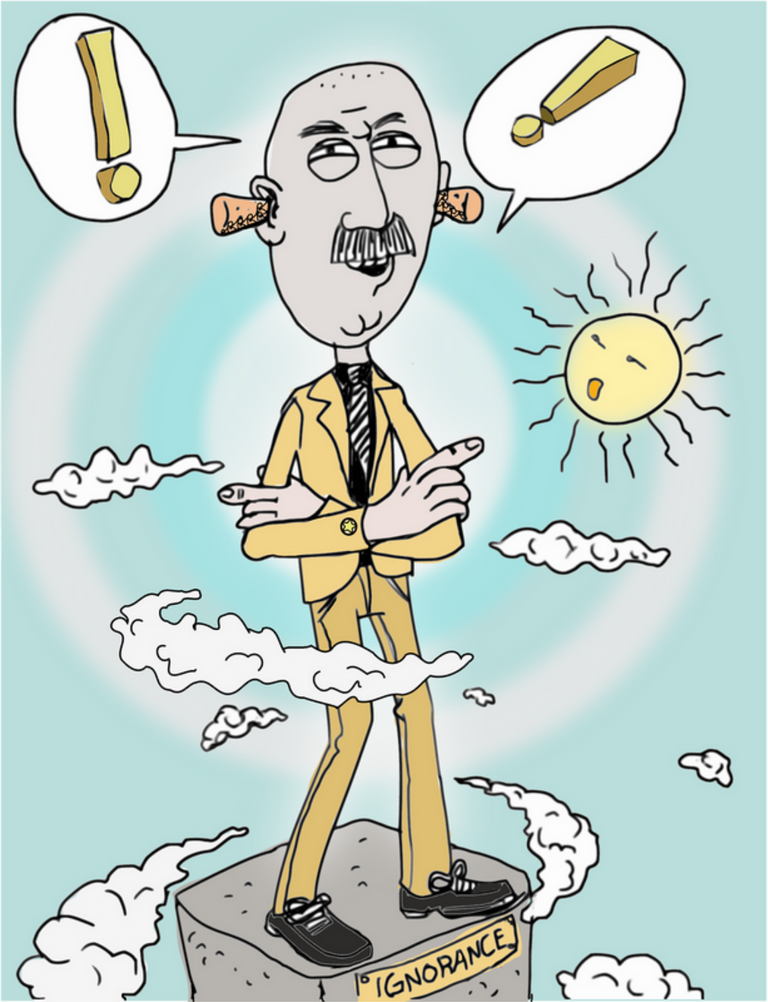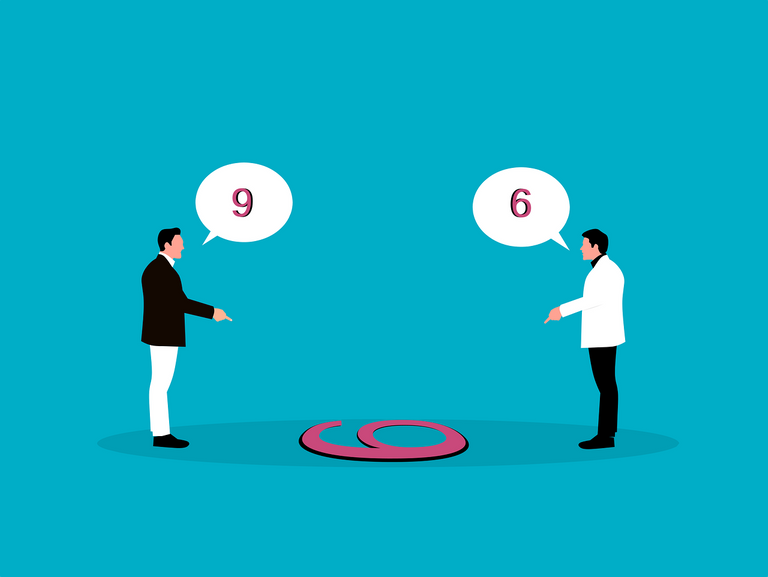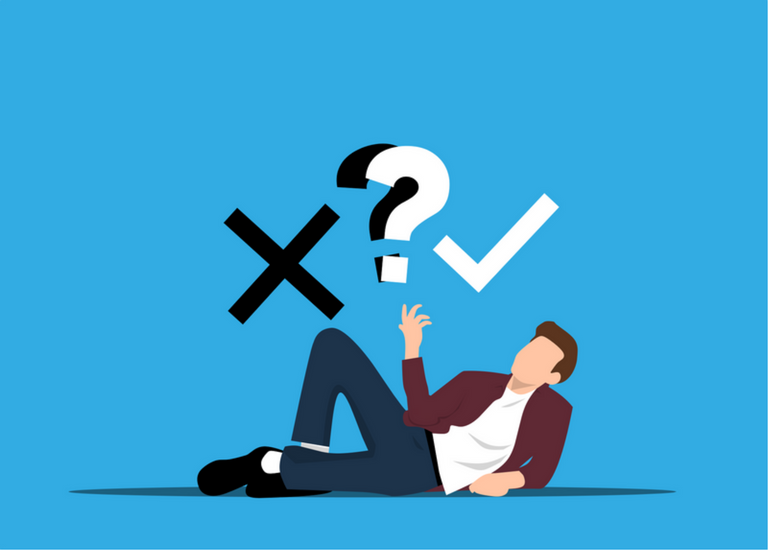Is It Possible To Eliminate Bias? (Probably Not)
This post is meant to be a short "stream of thought" sort of post, but we'll see where it ends up. It is the culmination of reflection on a recent post by @blocktrades discussing confirmation bias, and thinking about the implications of an emerging AI paradigm. The former sparked a reignited the intention to post about a subject that my ADHD brain had already forgotten. I'm feeling pseudo-philosophical right now, so I'm going to "let her rip 'tater chip."

Biases are everywhere. I have them. You have them. We all have them. I don't think any place in this world is immune, as long as we keep playing this game of incomplete information that is life. As I briefly touched upon in my reply to blocktrades' post, our world is distorted by empirically driven beliefs and experiences. Personal introspection is the only intuitive methodology that you can completely trust. Let's be honest, we're in crypto. We all have trust issues.
Is is solipsistic in here or is it just me? Hurr, hurr, hurr...
But how do you make sure that you are following the right path and not being seduced by your own biases? From my perspective, quite simply, you can't. Sorry jack, your sensory input is your ultimate window to the world and it's subject to high-jacking whether that's due to your own biases or the social engineering of others (whether this is done consciously or unconsciously).
Intuitively it may seem that our best test for this is intersubjectivity. It is a way of averaging or coming to a consensus on the perception of reality. If 9 out of 10 dudes can agree that they're looking at a cat, it's probabilistically a cat.

In the arena of ideas though, this is tricky. Opinions tend to be based on experience and we do not all share the same experiences. Even when we share identical hardware, as is the case with twins, upon divergence of their respective environments their opinions and personalities start to differ. We could attempt to contend with our beliefs through debate, but this could easily go either way. It's possible that we could further galvanize our biases. The orators at debates are rarely open-minded and are seemingly trying to sway the masses of those that are undecided. I attribute most of these people to sophists who are posturing with specious arguments. However clever they may be, it is likely that there is some degree of fallaciousness due to the impossibility to shed personal bias. (We'll touch more on this in a moment.)
I'm a firm believer in the scientific method. We can take this crazy beautiful sensory interface we have been given and design an experience (experiment) in a way that others can replicate. Much like our blockchain, scientific consensus is driven by scientific data that can act as a personal ledger which can be compared to the empirical findings of others. An experiment is essentially creating an environment where we can share an experience. We can then intersubjectively examine what at the very least seems to be objective reality, because when coupled with experience it is more honest.
Science does not come without its problems. This typically is introduced when opinions begin to be inserted. In the past few months I had to do a literature review for a certain controversial subject. There was very little written about the topic in recent years. I had to dig back over 30-40 years to start finding anything of interest. One scientific article I found was a scathing review of the subject and how it should be considered pseudoscience along with topics such as parapsychology and oxidative phosphorylation. In case you didn't know, oxidative phosphorylation is arguably one of the most important processes in all of biology. This guy was likening it to quacky-mysticism. Wild.
I think the important thing to evaluate here is: Does my implicit bias really matter? Does it affect the lives of others? What impact does it have on the general trajectory of my life? Luckily the existentialist in me says that in most cases, "none of it matters."

If we don't want to intentionally deceive others, why are we so keen on clinging to biases?
Some of this is likely cognitive dissonance. We want something to be correct so much, that we restructure our beliefs rather than changing our opinions. If I believe in Santa Claus, the world at large is likely safe. If I was touting the healing ability of black salve well, people might get hurt.
It seems like we have an inherent need to be correct. We can limit bias when we shed this tendency of humanity. In the scientific context, the danger starts entering when we form the conclusion section of our papers. This problem is exacerbated by a system that doesn't reward findings that aren't "significant" and people who go down the wrong path too many times don't receive funding to continue research.
Is it better to be "correct" or adaptable?
Evolution will ultimately be the arbiter of truth.
There are many attempts to quantify the growing AI space. Much of the debate seems obsessed on deciding whether we are all going to get robot butlers so we can do more important things like infinitely scroll TikTok, or if we'll be relics surviving in a zoo designed for the entertainment of gun toting terminators.

A post by @tarazkp highlighted that an average of 25% of American jobs are projected to be lost to AI. Don't worry, they say. We have always created new markets. AI is different though. Humans are alright at judging exponential growth 👀.
! [Hidden Spoiler Text] We suck at this.
Ok fine. We are great at predicting the future of a possibly paradigm shifting technology that may or may not benefit us, right? (By the way the article gives us insight to the possible evolutionary power of pessimism.)
These things are not easy to quantify by any means. If we do let our bias (experiences) creep in and think that everything will work itself out we can plan for new jobs. Ask me ten years ago if I thought AI could create art and music and I would have laughed. Now, not so much. It is hard to be correct whenever there is so much complexity and so many permutations of possibility. I could narrow down the statistical analyses, and focus on a market that is safe. Through rigorous debate I could uncover the "truth" and form the best possible plan. The future is never written. I have no way of knowing what jobs will be safe when the AGI era unfolds, but if I'm able to adapt to any set of circumstances I may just have a chance.
TLDR:
Being correct is relative to whatever index of time that you are living in. Biases, although unavoidable, hold us to past experiences. We may never be able to break free from them if we're unadaptable. Live transiently in the moment, and always keep an open-mind to any possibility.
All images came courtesy of Pixabay via royalty-free images.
P.S. @tarazkp I have something interesting coming for you in the next few months because of one of your comments from this post.
"I suspect, there is not an AI programmer of that quality on Hive at all."
Challenge accepted. I need to learn some AI anyway.
The world need to live with biased. There is differences in opinion and at the end of the day understanding comes in to create an argument
Why does the world need bias? How does bias help achieve a personal world view that is closer to objective reality? That's what I'm after.
Thanks for your contribution to the STEMsocial community. Feel free to join us on discord to get to know the rest of us!
Please consider delegating to the @stemsocial account (85% of the curation rewards are returned).
You may also include @stemsocial as a beneficiary of the rewards of this post to get a stronger support.
I think you're right: it's impossible to eliminate biases completely, or adequately. And therefore we need to come up with alternative mechanisms to do it for us. One is the method of science that you mentioned. Another is increasing group representation. For instance, most feminists are female. This means that, even with the best of intentions, they will tend to be very aware of unfairness directed toward women, and relatively blind toward unfairness directed toward men. Only when 50% of feminists are men will there be hope for true justice. These are just two examples of many ways we can outsource objectivity, even when it goes against our nature.
There was a time when you told me you couldn’t blog. Lucky for you, we’re not keeping score.
Or maybe I’m misremembering the interaction to serve my comment here and now. Ha! The duality!